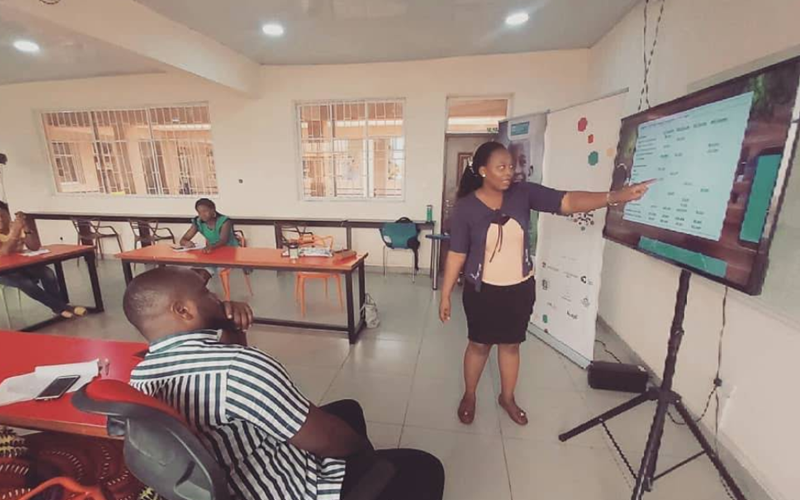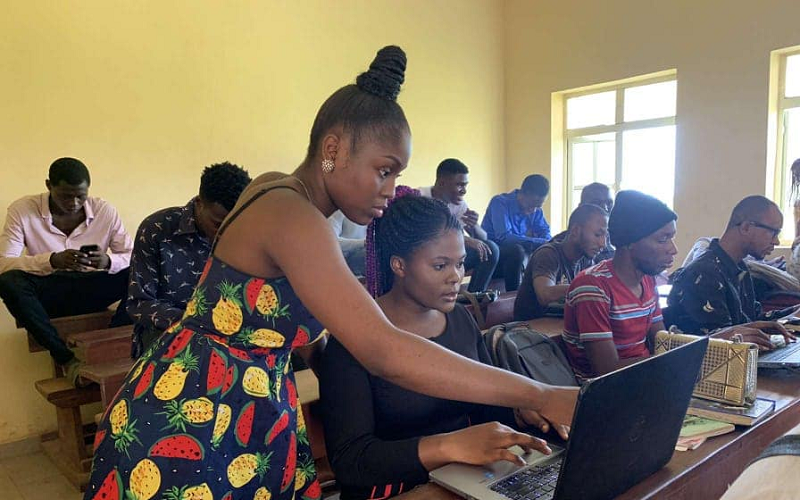In many parts of Nigeria, you will still find street-side technical tutors—mechanics, phone repairers, tailors, electricians—teaching eager learners under a makeshift stall or under a tree. Their methods may be informal, but their skills are real, their demand palpable. The challenge has always been how to recognise and formalise that expertise in a way that benefits both tutor and student.
Now, an ambitious initiative is attempting exactly that: converting these informal technical tutors into recognised micro-credential providers, using a combination of USSD systems and offline-first mobile kits. In effect, the plan is to bring legitimacy, accountability, and reach to the informal vocational education ecosystem in Nigeria.
This innovation promises not only to validate skill delivery on the street, but also to bridge infrastructural gaps, ensuring that even in low-connectivity zones, knowledge can flow—and credentials can be earned.

Table of Contents
The Model: How USSD and Offline-First Tech Make It Possible
At the heart of the approach is a hybrid technology infrastructure designed for Nigeria’s realities. Rather than assuming everywhere has fast, stable internet, the solution is built to function even when connectivity is minimal. Two elements are central:
1. USSD integration.
With USSD (Unstructured Supplementary Service Data), tutors and learners can interact using basic phones—no need for smartphones or constant data. Through short codes, tutors can register, receive instructions, issue assessment prompts, and learners can respond, check status, or receive verification. The USSD layer acts as a low-bandwidth interface, ensuring that no one is left out due to a lack of internet access.
2. Offline-first mobile kits.
For those with smartphones or tablets, the system provides an “offline-first” app or kit. It lets tutors and learners download content, assessments, and learning modules whenever connectivity is available, and use them offline. The app then syncs results, attendance, and certificates when the device regains network. This makes it possible for a tutor in a remote village to run a micro-credential course even during network downtimes.
Together, these tools allow the informal tutor to log their sessions, assess learners, and issue micro-credentials that are recognised by a central platform. Learners earn verifiable credentials which they can show prospective employers or share online.
To ensure quality, the program includes auditing and monitoring: random sampling, peer reviews, and occasional in-person inspections to safeguard credibility.
Challenges, Benefits, and Real-World Impact
Key Challenges
The ambition is bold, and several hurdles must be addressed:
- Trust and recognition. Many employers, institutions or customers currently don’t take street-side credentials seriously. Bridging that perception gap is critical.
- Quality assurance. Without robust checks, there is a risk of substandard instruction or “credential inflation.”
- Adoption friction. Some tutors may resist new systems or lack digital literacy to adopt the tools.
- Sustainability & funding. Initial rollouts may require subsidies; scaling will demand cost recovery or revenue models.
- Regulation and accreditation. How do these micro-credentials plug into existing certification systems or state vocational boards?
Despite all that, the benefits are compelling:
- Inclusivity. Tutors and learners who are off the grid (internet-poor areas) are included.
- Scalability. Once the platform is established, replication to new towns and states is easier.
- Formal recognition. Tutors become micro-credential issuers with legitimacy; learners gain recognised credentials.
- Economic uplift. Skills translate more reliably to income, employability, or business growth.
- Data and insight. The platform accrues data on skills demand, tutor performance, and learner outcomes, useful for policymakers and development agencies.

Early Use Cases and Outcomes
In pilot regions, a few street-side tutors have come on board. For example, a phone repairer in a semi-urban area began issuing micro-credentials to learners who completed modules on “motherboard troubleshooting” or “battery replacement.” Students reported more confidence when applying for formal repair shops, citing credentials as evidence of their training.
In one community, electricity technicians in remote districts used the offline mobile kit to run weekend sessions even when the network was spotty. After syncing, their learners’ certificates became visible to prospective local contractors, improving trust and marketability.
Though still nascent, these experiments already hint at transformative effects: tutors shifting from informal hustle to semi-formal educators, and learners gaining documented skills rather than just experience spoken about.
What the Future Could Hold—and What Must Be Done
To scale this idea nationwide, several strategic moves are essential:
Partnerships and Stakeholders
The model will depend heavily on alliances with:
- State vocational and technical education boards, so micro-credentials gain formal recognition or equivalence.
- Telecom operators, to facilitate USSD infrastructure, zero-rating of the app, or special data packages.
- Development partners and NGOs, providing seed funding, capacity building, and oversight support.
- Employers and industry bodies, to accept and value the credentials, ensure relevance, and provide apprenticeship paths.
- Tutor networks and associations, to foster uptake, peer support, training, and shared governance.
Building Trust and Acceptance
Public awareness campaigns, endorsements, and success stories will help shift mindsets. If credentialed learners secure better jobs or earnings, word of mouth will amplify the appeal. Also, maintaining strict quality checks and transparency in operations will reassure stakeholders.
Training and Capacity Building
Equipping tutors with digital skills, assessment design competence, and pedagogy training is imperative. The tech must be easy, intuitive, and backed by strong support (hotlines, field agents). Peer mentoring and communities of practice can accelerate adoption.
Financial and Business Models
The initiative must evolve from grant dependency to sustainable revenue models. Possible approaches include:
- A small commission or fee on credentials issued.
- Subscription models for advanced modules or tutor tools.
- Corporate sponsorships or pay-for-service models for employers who want certified talent pools.
Policy and Accreditation Integration
For long-term legitimacy, micro-credentials should be aligned with national qualification frameworks. States and the federal government must recognise or ratify these credentials, perhaps linking them to further training, credit transfers, or public sector hiring standards.
Scaling Gradually, Region by Region
Rather than trying to go nationwide at once, the model should expand regionally—mastering each zone (e.g. a few states) before pushing further. This allows iteration, local adaptation, and capacity strengthening.

Conclusiom
The vision is clear: transform the informal but vibrant world of street-side technical instruction into a structured, credible, scalable micro-credential ecosystem. In doing so, thousands of Nigerian tutors get uplifted; millions of learners gain validated skills; and the workforce bridging informal and formal economies narrows.
Let this programme be a model not just for Nigeria, but for many developing nations where informal vocational education is the norm rather than the exception.
Join Our Social Media Channels:
WhatsApp: NaijaEyes
Facebook: NaijaEyes
Twitter: NaijaEyes
Instagram: NaijaEyes
TikTok: NaijaEyes





































